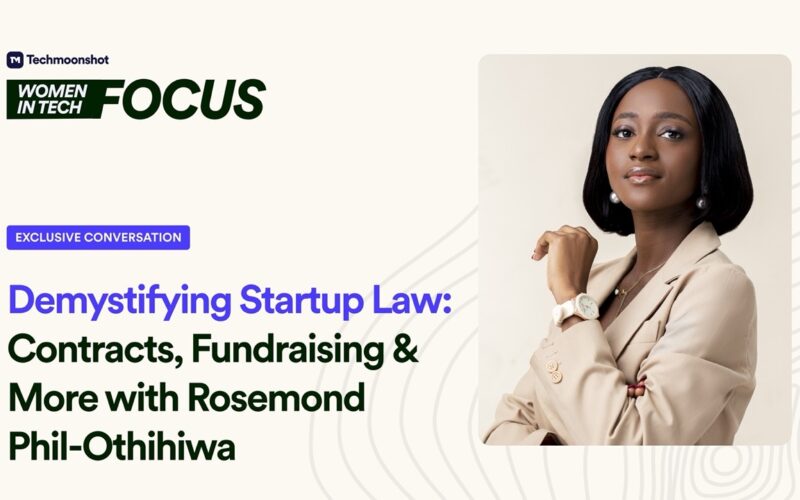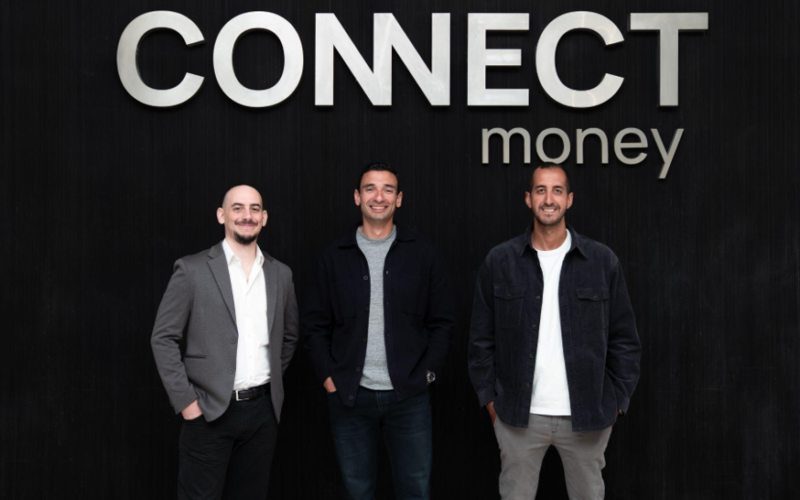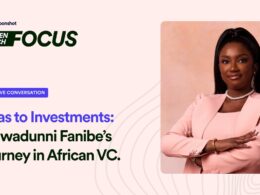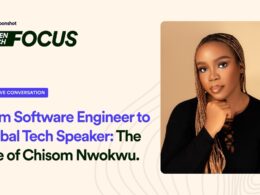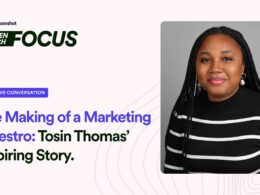Rosemond Phil-Othihiwa is a renowned startup lawyer, public speaker, and mentor for the Google Black Founders Accelerator program in Africa. In this exclusive conversation, she shares invaluable insights on what African founders need to get right from day one to set up their startups for success.
Drawing from her extensive experience working with startups, Rosemond highlights the critical steps and best practices that can help founders navigate the challenges of the entrepreneurial journey and build a solid foundation for sustainable growth.
Can we get to know you?
All right, thank you. My name is Rosemond. I am a corporate and commercial startup attorney, specializing in legal services for technology-based companies. I have nearly a decade of experience working with business organizations on issues related to corporate governance, regulatory compliance, due diligence, and venture capital fundraising. My journey into the technology sector began in 2018, and I currently serve as a mentor for the Google Black Founders Accelerator program in Africa. Additionally, I act as a consultant to several tech companies addressing challenges within the African continent.
Running my practice for almost a decade has been an exciting experience. When I am not working, I enjoy binge-watching YouTube videos, reading, and indulging in my love for food as a dedicated foodie. So that’s just a little about me professionally and a little bit personally.
So the next question is, can you share your journey into law practice and what motivated you to specialize in startup and corporate law?
Okay, all right. It’s been quite a long journey, but I’ll try to summarize it. As I mentioned earlier, my journey into technology began around 2018-2019. Before that, I had worked as an associate in a law firm for about four years. During my fourth year, I realized I wanted to do something different from just pure litigation. I got an opportunity to co-found a legal technology company with a friend, which I seized.
This opportunity introduced me to the world of startups. Within six months, I had to learn how to hire software developers and build products. We had a working MVP in less than six months, which truly opened my eyes to the immense possibilities in the tech industry.
And of course, I knew there was a lot of investment coming into that space. Coupled with my passion for solving legal problems using technology, that marked my entry into the tech world. This led me to learn the basic principles of entrepreneurship because I understood that being a lawyer is one thing, but understanding the world from a business owner’s perspective is another.
I spent the next two to three years joining several incubator and accelerator programs to grasp the nuances of building a tech company. With my legal background, I could easily bridge the gap. After moving on from my startup, I found myself constantly advising founders on various legal issues. This experience ultimately led me to where I am today, running my consultancy practice.
So, yeah, that’s just a little bit of my journey. So far, it’s been quite interesting. I’m on a personal mission to impact 10,000 startups in ten years, and I would say I’m well on my way. Thank you.
Okay, so to the next question, did you have any role model or mentor who influenced your career path?
Oh yeah. So coming into the business, I would say the entrepreneurial landscape, I definitely know that building a business is not a sprint, it’s a marathon. I wouldn’t even consider myself as having learned everything I possibly could without referring to my first boss, Mister Olatunde Adegbesan, S.A.N., with whom I worked for four years. At his firm, I got to understand the nuances of corporate law, so I had a solid foundation. Those four years allowed me to build on my knowledge.
Coming into the tech ecosystem, I have lots of people I look up to. One of them, of course, is Doctor Ola Brown. She embodies what I believe women in VC should really be like. She’s dogged, and I appreciate her contributions to the ecosystem. I find her teaching a lot on very interesting subjects. I would say she’s a mentor from afar, although we have spoken once or twice as she has come to speak at a couple of events organized by my organization.
From the male side of things, I’m very inspired by Iyin Aboyeji. I have an acquaintanceship relationship with him, and I think he is an innovator and builder. While I have a couple of mentors, these are the two people, male and female, who I believe are very important voices because they are forward-thinking. My influences spread beyond them; I have different motivators, colleagues, and seniors in this field. There are so many I can’t even begin to count, which is why I haven’t mentioned any more names.
So the next question is, how has your experience as a Google for Startups mentor influenced your approach to advising startups?
I wouldn’t attribute it solely to my experience as a Google mentor because the mentorship appointment was a result of what I was doing prior to its appointment. As I mentioned, I have a strong focus on building competence in corporate governance. This is a field I am very passionate about because businesses rise and fall based on the presence or absence of solid corporate governance principles. By corporate governance, I mean the ways organizations are set up, the policies they adhere to, issues regarding diversity and inclusion, employee management, stakeholder management, investor relations, and business procedures and practices.
These skills were built over time as I learned what it takes to build successful companies and also from observing the failures of different companies that have experienced shutdowns recently. This has reinforced my understanding that corporate governance is crucial and unavoidable. Based on that, I found myself constantly speaking about this topic at various incubator and accelerator boot camps. I then had the opportunity to apply for the Google Startup program and was accepted.
In this capacity, I attend workshops with founders who are backed by Google, specifically through the Black Founders Fund. We assess and analyze their growth, identify their challenges, and address their specific needs in terms of regulatory compliance, governance, risk, and compliance. Depending on the sector, the requirements can vary—for instance, what is needed in the finance sector may differ from agri-tech or logistics tech. We provide industry-specific advice, which I have found to be very resourceful in my current role.
While this is not all I do, the experiences I have had as a lawyer, my understanding of the African tech ecosystem, and my knowledge of corporate governance have enabled me to help these startups build solid businesses. I am proud of the traction we have achieved so far.
Okay, so moving on, what legal trends are you currently seeing in the startup ecosystem and how should startups prepare for them?
Currently, we are witnessing a mix of good and bad news in the African tech ecosystem. On the downside, some founders have decided to close their operations. This is reflected in the significant drop in investments, with a nearly 49% year-on-year decline compared to last year. Although the first quarter of 2024 was not particularly strong, it wasn’t entirely bleak either. We saw two major investments totaling around $100 million entering the African tech space.
Now, the focus for investors and venture builders has shifted from just valuations and funding to key metrics that demonstrate a company’s ability to achieve product-market fit and sustainability. Certain sectors are gaining more attention from investors, particularly those related to climate, renewable energy, and AI.
Another notable trend is the increased emphasis on corporate governance and due diligence. Investors are scrutinizing founders more rigorously, asking detailed questions about financials to ensure that funds are not being misused. This heightened scrutiny aims to ensure that companies are well-managed and transparent.
Although it is currently a slow season, there are signs of improvement. May was a particularly strong month, and there is optimism that the situation will continue to improve. Founders are now focusing on getting their houses in order, recognizing that it is no longer business as usual.
In 2022, the total funding that poured into the African ecosystem was around $4.9 billion, but this year we are seeing slightly less than that. Nevertheless, we anticipate that with better practices and increased scrutiny, more sectors beyond just fintech will open up for investment. These are some of the trends to watch out for as we move through this year and beyond.
So the next question is, what are the most critical legal documents a startup should have in place from day one?
All right, so there’s a lot to consider. Honestly, I could categorize them, and it would take quite a while to go through everything. However, before you start thinking about whatever it is you’re building, ensure that your company exists as a properly registered entity. This foundational step is crucial because investors want to engage with properly structured and registered entities.
First, you need to determine the structure of your company early on. This structure will enable you to speak confidently to investors. Early-stage founders often overlook the importance of having discussions and agreements properly documented. Ideas are plentiful and without proper documentation, they can be easily lost or misunderstood.
To protect your intellectual property, ensure that you have non-disclosure agreements (NDAs) in place with prospective promoters and partners. Founders’ agreements are also essential. Each founder should know their roles, contributions, and what an exit strategy looks like in case of disagreements or company closure.
If you plan to offer equity to your employees, an employee stock option plan (ESOP) is necessary. Proper documentation of equity offered in exchange for services is crucial, particularly in the early stages. Maintaining an updated cap table that records the equity distribution and financial investments is important for clarity and transparency.
Your data room should be comprehensive, including your pitch deck, business model, financial model, product roadmap, and other business development documents. As you recruit staff, provide them with stock option plan documents and an employee handbook detailing responsibilities, rights, and company rules.
Intellectual property (IP) assignment agreements are vital. Anyone developing your product should have a clear agreement stating that the product belongs to the company, not the individual. Service level agreements (SLAs) and third-party rights agreements are also important.
When you start engaging with investors, decide if you’ll be pursuing an equity-based route. If so, you’ll need to develop shareholder agreements. If your company is registered internationally, consider documents like Simple Agreements for Future Equity (SAFE) or convertible notes. Each stage of your company’s growth will require different documents.
What I’ve done is collapse three growth cycles into one explanation. There’s more to consider, but these are the basics to start setting your house in order.
What are the most important considerations for startups when structuring their company?
I would say start with the end goal in mind. What’s your ultimate objective for building your startup? Do you intend to sell? Are you aiming for a management buyout? Do you want to be acquired and merged with a bigger competitor? Do you want to run your company long-term or aim for an IPO? Think about the end goal and work your way backward from there.
One of the first things to consider in terms of your structure is knowing the right form of company to register. Are you registering as an LLC? This might not be ideal if you intend to attract institutional investors like venture capital organizations. You might want to register as a C corp, especially if you are operating in the UK, the US, or any African country. Understand what your regulators require, which means having a compliance team or a legal person on board is crucial.
I see a lot of founders trying to wing things when it comes to structure. You can’t afford to do that. Get legal advice. I’d like to disclaim that whatever I’m saying now is not legal advice. You need to consult a legal consultant or a lawyer who understands your unique organization and can give you advice regarding incorporation dynamics and structure patterns.
It’s essential to have someone versed in the field to help you understand the nature of business formation that works for your particular industry. There’s no one-size-fits-all, but there are basic principles you need to follow, which I’ve mentioned. Starting with the end goal in mind and ensuring your structure aligns with your future objectives will set you on the right path.
So back to Google for Startups, what has been the most rewarding aspect of being a mentor?
I think it’s the connections and the people I get to meet from different parts of the world. Despite our different races and cultures, we are unified by innovation. The best experience for me has been interacting with various builders and ecosystem contributors globally. I’ve been privileged to speak at one or two conferences hosted by Google, and it’s been fascinating to meet people solving problems within their own spaces and places.
One of the critical things for me is the networks I have been able to build as a result of the privilege of being a mentor with Google. It has been a very rewarding experience.
How do you balance your role as a lawyer, a public speaker, and a mentor? What’s your secret?
I would say they are in sync and not too far from each other. Being a mentor means you have to speak in public and articulate your thoughts clearly. To do this effectively, you need to study and read, which are also essential skills for a lawyer. So, you find that these roles flow into one another seamlessly.
As a founder, a consultant, a mentor to startups, and a solution provider to my clients, I am constantly solving legal problems. These roles are interconnected, making it feel like I’m doing one thing with different facets. It means I have to be in more places, have more meetings, and interact with more people, but everything aligns with my core practice of law. I just happen to do it in unique and diverse ways simultaneously. So, it doesn’t feel like I’m doing too much; it all integrates well.
What is a common misconception about startup law that you would like to debunk?
That’s a very interesting question. I’ve never been asked this before. I would say that startup law is both easier and more challenging than conventional legal practice. One of the biggest misconceptions about startups is that they are an easy way to get rich. In reality, you’ll likely face financial struggles before achieving success as a startup lawyer.
As a startup lawyer, your knowledge has to be constantly evolving. A common misconception is that startup lawyers are less skilled or less expensive than traditional lawyers. In fact, startup lawyers often need to be more versatile, as they deal with both domestic and international laws. We have to be as competent in international regulations as we are in local ones, given the global nature of the startup ecosystem.
Another misconception is that the field of startup law is small or less significant. On the contrary, it’s quite expansive and requires a high level of expertise. Traditional lawyers tend to be more rigid, waiting for clients to come to them. In contrast, startup lawyers often need to be proactive, reaching out and making themselves available for consultations. This proactive approach, combined with the necessity to understand and navigate global factors, makes startup law a dynamic and demanding field. So, startup lawyers provide highly technical and specialized services that are on par with, if not more complex than, those offered by conventional lawyers.
So the next question is, what’s the most fulfilling part of working with startups for you?
I love it when startups hit their goals and targets. It’s incredibly fulfilling to see ideas that once only existed in someone’s mind become tangible solutions. I’ve had the privilege of advising companies from the idea stage to having a working MVP and going to market. Helping investors identify the right startups ready for business and getting them funded is another rewarding aspect of my work.
I’ve recently developed a passion for venture capital, and it’s gratifying to see my clients, the founders, get connected with investors who believe in their vision. Whether it’s through funding, management advisory support, or other means, it’s amazing to see these founders achieve their goals and bring their solutions to life. To me, that’s one of the most fulfilling parts of my journey.
Can you share any tools or techniques that help you stay organized and productive?
Oh, that’s a big one. We had a mini challenge even setting this meeting up. My schedule gets so clogged up. In fact, I have a meeting in the next ten minutes. Honestly, I don’t know where I would be without Google Calendar. Scheduling my meetings is crucial, and I also do a weekly review of my tasks for the upcoming week. This helps me stay organized. For example, I know on Tuesday I’m scheduled to speak here, on Wednesday I have something to draft, and on Thursday I have an interview to grant.
It’s also important to avoid trying to do everything at once. I have a team, and when push comes to shove, I delegate. Delegation is key to making the workload lighter. Additionally, I use technology to plan my day, including alarms and calendars. Automation is another helpful tool for managing tasks, except for those that require my hands-on involvement. These little tips help me manage my schedule effectively. No matter how many PAs you have, some things only you can do, so I try to balance delegating with handling critical tasks myself.
All right. So outside of work, what do you enjoy doing?
Yeah, I said it at the beginning. Honestly, I’m a bit of a couch potato. Despite my energetic public persona, I actually enjoy my own space. You’ll often find me at home, binge-watching YouTube videos all day or going out to eat. I love visiting nice restaurants and trying new delicacies. Dancing is another passion of mine, so I go out dancing once in a while. I also enjoy house parties and game nights hosted by friends, where I can engage, network, and have fun with my colleagues and friends. However, I also value my downtime at home to rest. So, I’m quite a mixture—I can fit into any situation, really.
Can you share a book or resource that has had a significant impact on your career?
Oh, there’s so many. But I would say Brian Tracy’s books have been incredibly helpful, especially his books on critical thinking. Also, books related to the VC ecosystem are invaluable. I find mini-books written by David Zinoturo, a venture capital fellow, very helpful. ‘Linchpin’ by Seth Godin is also a powerful book. I also read lots of articles online.
So, there are many books that I have read and continue to read, but these are some of the major ones I constantly revisit. Additionally, I love publications released by Africa: The Big Deal. I currently work with the team to develop and curate programs that talk about funding in the African continent. I work with Max Giacomelli and Maxime Bayen, the current editors of that database. This exposure keeps me updated on funding within the African continent and is a great way to stay informed about the startup space.
Okay, so we are rounding up, but the next question is, if you could master one new skill instantly, what would I do?
I would say it’s currently a work in progress, but it’s such a struggle because I do not have a mathematics background. One major skill I definitely want to develop is becoming a fantastic financial modeler. I want to be able to read financial statements and use Excel with the highest level of accuracy. I need to look at a financial statement and know exactly what it’s saying in less than two minutes. If that were a superpower, that’s what I would want—to understand the dynamics beyond all the technical jargon in the documents. That’s something I aspire to achieve.
So what are some current happenings in the African tech industry that you’re excited about at the moment?
Anything that has to do with ESG is something I find particularly interesting. AI governance is also an emerging and innovative field. Regtech, though not very popular now, is something I see becoming crucial. As companies continue to build and innovate, regulatory scrutiny will increase, making technology that solves compliance and regulatory governance problems invaluable. Anyone developing in this sector is onto something significant. While it may not catch on immediately, in the next ten years, it will likely become non-negotiable.
Artificial intelligence is another hot topic, but my primary focus is on AI governance. Tools built to regulate AI and ensure compliance will be essential. Europe has already released the Artificial Intelligence Act, so there will be significant regulatory developments in this area. Innovating in data protection and related fields will be highly impactful.
Climate tech is also a big deal. Venture capital has the potential to trigger economic growth, and VCs are looking for companies that solve problems and increase GDP. This includes climate tech, logistics tech, AI, and addressing environmental issues like pollution and degradation.
Thinking about the future, industries beyond fintech are emerging. Health tech, for example, is a very promising field. Companies solving medical and health-based problems using technology are on the right track. These are the sectors I believe will be highly significant moving forward.
Thank you for your time it has been a pleasure talking to you
Thank you for having me as well. it’s a pleasure.






